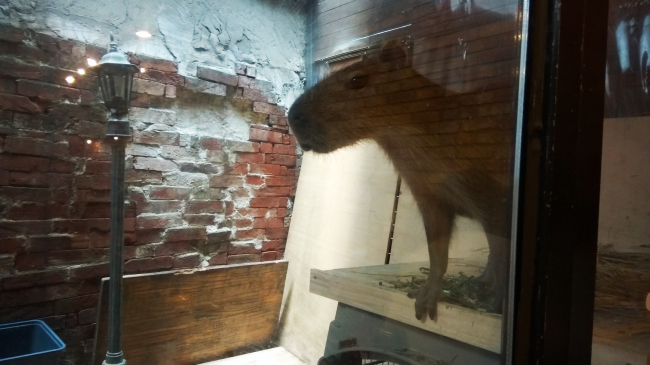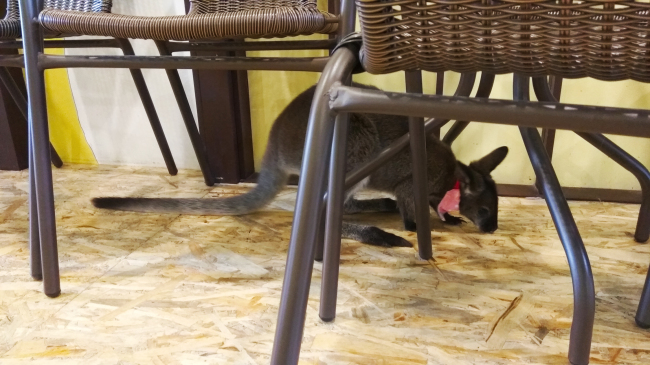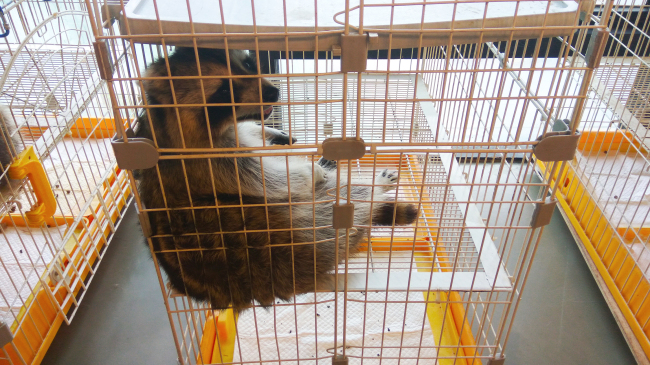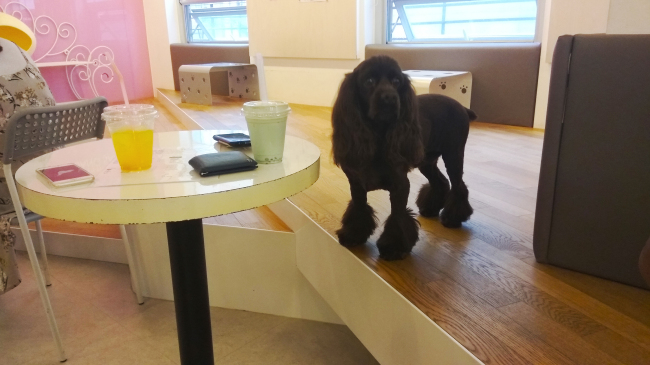Legislative gap adds to uncertainty for animal cafes
By Korea HeraldPublished : Aug. 11, 2017 - 17:31
A lone capybara sits behind a glass pane in its enclosure. Surrounded by coffee-sipping patrons in a cafe, it is a long way from its native home of South America.
Animal cafes in Korea are becoming increasingly numerous, and the wildlife on display increasingly diverse. For example, in some of Seoul’s most popular establishments, you can now meet meerkats, raccoons, fennec foxes and even wallabies.
But is it a good idea to keep animals in cafe environments?
Animal cafes in Korea are becoming increasingly numerous, and the wildlife on display increasingly diverse. For example, in some of Seoul’s most popular establishments, you can now meet meerkats, raccoons, fennec foxes and even wallabies.
But is it a good idea to keep animals in cafe environments?

“I think animal cafes should respect animal welfare and stop selling animals (as gimmicks). In light of the weakness of management of even zoos, animal cafes for exotic animals should be shut down,” said Kim Hyun-ji of Korea Animal Rights Advocates (KARA).
The suitability of exotic animals for cafe inhabitation is uncertain. However, according to the 1991 Animal Protection Act, it is only illegal to engage in the capture, collection and trade of animals if they are an endangered species. These are defined under the Convention on International Trade in Endangered Species of Wild Fauna and Flora, of which Korea is a signatory.
This means animals like raccoons and foxes that are not endangered can fall into a regulatory gray area.

“In Korea, dogs, cats, rabbits, ferrets, guinea pigs and hamsters are considered companion animals and regulated under the Animal Protection Act for breeding and sale. In animal cafes, we don’t have any other specific law to regulate exotic wildlife,” said Janet Yoo, policy manager at Coexistence of Animal Rights on Earth.
As legislation lags behind, the relatively new trend of animal cafes poses other legal questions.
Article 32 of the Animal Protection Act currently mandates minimum standards for businesses that provide animal funeral services, or deal with the sale, importation or production of animals.

An amendment to the article is expected to come into effect in March 2018 that will require minimum standards for businesses that engage in the exhibition, day care, grooming or transportation of animals.
Many cafes do institute rules to ensure the safety of animals and patrons. These can include bans on flash photography, limited playtime and the presence of staff in enclosures both to clean and monitor animal and customer behavior.
However, there are concerns the training of well-intentioned cafe owners and staff may not be adequate for the animals’ needs.
A 2015 report prepared by KARA for submission to the National Assembly revealed that some cafes did not have adequate access to natural light and water for animals. The dossier also included incidents of skin irritations and signs of aggression among animals.

“The owners of animal cafes don’t need specific training to open a shop. I think maybe they just like animals and it could be a way to spend time with them,” said Yoo.
A 2016 global survey of pet ownership revealed only 32 percent of South Korean households having pets, the lowest proportion out of the 22 countries surveyed. So a chance to spend time with animals if you don’t have your own is in high demand. Given proper regulation, animal cafes could provide educational opportunities.
“People can have more experiences meeting dogs and cats, and they (animal cafes) can help people to consider adopting one from a shelter,” said Yang Kyeong-mo, a veterinary oncologist at Perth International Animal Clinic in Seoul.
However, there could still be risks to both animals and humans in animal cafes.
“Even trained animals can suffer from stress from direct contact with too many unknown people,” said Yang.
Animals may also be poisoned by caffeine if they ingest patrons’ drinks, and spread zoonotic diseases if proper hygiene is not maintained.
“Facilities at the cafe need to be cleaned according to proper regulations to prevent disease, but some of the cafes do not do so,” said Yang.
With animal cafes only a recent trend, the question of whether or not they are suitable living environments for animals is still be unclear. But animal rights advocates and animal experts alike agree regulation is the first step to striking a better balance between human curiosity and animal wellbeing.
“Most cafes really care for the animals they keep. But we do not have compulsory regulations on animal cafes. So we definitely need to have these for better environment for the animals,” said Yang.
By Chantelle Yeung / Intern reporter (cyeu7774@heraldcorp.com)
-
Articles by Korea Herald







![[Graphic News] More Koreans say they plan long-distance trips this year](http://res.heraldm.com/phpwas/restmb_idxmake.php?idx=644&simg=/content/image/2024/04/17/20240417050828_0.gif&u=)
![[KH Explains] Hyundai's full hybrid edge to pay off amid slow transition to pure EVs](http://res.heraldm.com/phpwas/restmb_idxmake.php?idx=644&simg=/content/image/2024/04/18/20240418050645_0.jpg&u=20240419100350)






![[From the Scene] Monks, Buddhists hail return of remains of Buddhas](http://res.heraldm.com/phpwas/restmb_idxmake.php?idx=652&simg=/content/image/2024/04/19/20240419050617_0.jpg&u=20240419175937)

![[KH Explains] Hyundai's full hybrid edge to pay off amid slow transition to pure EVs](http://res.heraldm.com/phpwas/restmb_idxmake.php?idx=652&simg=/content/image/2024/04/18/20240418050645_0.jpg&u=20240419100350)

![[Today’s K-pop] Illit drops debut single remix](http://res.heraldm.com/phpwas/restmb_idxmake.php?idx=642&simg=/content/image/2024/04/19/20240419050612_0.jpg&u=)